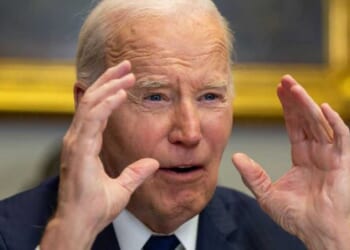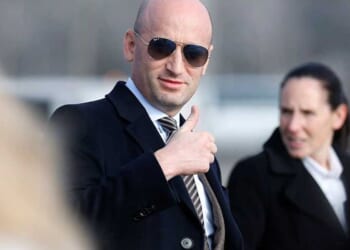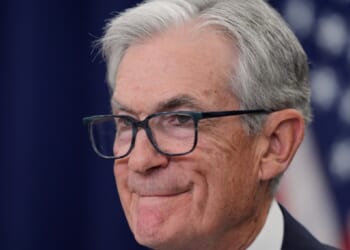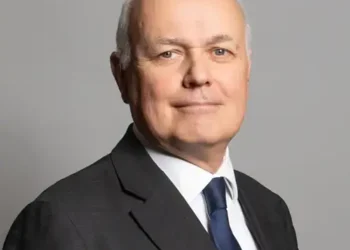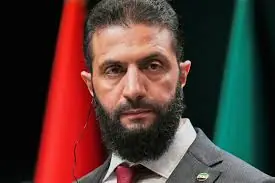
[Order Michael Finch’s new book, A Time to Stand: HERE. Prof. Jason Hill calls it “an aesthetic and political tour de force.”]
Ahmed al-Sharaa is slippery, Janus-faced, speaks with a forked tongue, and knows that, as Muhammad himself said, “war is deception.” And therefore, Ahmed al-Sharaa bears close watching as he attempts to sweet-talk the Trump administration, which has been taking al-Sharaa at face value. That is, official Washington seems to believe al-Sharaa’s insistence that he has changed. Even though al-Sharaa still had a $10 million bounty on his head, offered by the American government, until quite recently, for being a member of al-Qaeda, he has traded in his military fatigues for a suit and tie, speaks softly, and assures the world that he has become a “moderate” who claims he is ready to uphold the rights of Syria’s many minorities, including the Alawites, the Druze, and the Kurds, and is even ready to make peace with Israel. Of course, his former rebel soldiers have murdered 1,500 Alawite civilians in Latakia, killed hundreds of members of the Druze minority in Suweida, and are now trying to convince the Kurdish militia to become part of the Syrian National Army, a proposal which the Kurds rightly suspect that would leave them wide open to Arab depredations, without their own militias to protect them. And while early on he assured the world that he wanted to “live in peace with all of Syria’s neighbors,” he now has taken a much harder line on the Jewish state.
More on Ahmed al-Sharaa can be found here: “Will Syria’s New President Live Up to the World’s Hope? The Signs Aren’t Good,” by Hussain Abdul-Hussain, Algemeiner, October 3, 2025:
Last week, Ahmad Sharaa became the first Syrian president in 60 years to visit New York for the UN General Assembly’s annual meeting.
Bolstered by growing global recognition and newfound confidence, Sharaa deviated from his prepared remarks, offering a candid glimpse into his true perspective. If you believe he seeks peace with Israel or that Syria under his leadership will transform into an inclusive, stable democracy — as Senator Jeanne Shaheen (D-NH) optimistically suggested — think again. The reality is far less promising.
Since assuming power in December, Sharaa has carefully navigated the contentious issue of Israel. For months, he avoided joining other Arab governments in publicly denouncing the Jewish State or explicitly supporting Palestinian causes. He stated that Syria would pose no threat to any nation, implying a reluctance to engage in conflict with Israel. This restraint fueled speculation that Sharaa might pursue a form of peace, perhaps resembling the bilateral “hot peace” of the Abraham Accords, which prioritize direct normalization, rather than the multilateral “cold peace” that is contingent on resolving the Palestinian question through statehood.
Initially, al-Sharaa seemed to be surprisingly well-disposed toward Israel. He did not join other Arab states condemning the IDF’s actions in Gaza, nor did he speak out in support of the Palestinians. He said Syria wanted “peace” with “all of its neighbors.” That statement gave hope that al-Sharaa wanted to put an end to Syria’s conflict with Israel.
However, Sharaa’s stance on Gaza began to shift this narrative. At the Organization of Islamic Countries summit, held in Doha on September 14, Sharaa condemned an Israeli strike on Hamas operatives in Qatar, drawing parallels to what he described as similar aggression faced by Syria over the past nine months….
Ever since Assad fled Syria for Moscow, and the al-Sharaa-led rebels took power in Damascus, the Israelis have been bombing at will hundreds of sites where Assad’s army had stored its weapons. The IDF was taking no chances; it wanted to destroy those weapons, including several airbases and their planes, while it had a chance, when al-Sharaa was preoccupied with forming a new government, and, in any case, did not have any defensive weapons with which to stop the Israeli airstrikes.
Al-Sharaa has not tried to reassure the shattered Alawite community in Latakia, still shaken by the Sunni Arabs attacks and the deaths of so many of its members. The Druze in Syria, having been attacked by both local Bedouin tribesmen and troops affiliated with the government, are now looking to Israel for protection. The IDF went into action a few months ago to drive those attackers away from the Druze areas. And now some Druze in Syria want their stronghold in Sweida, and the area between Sweida and the Israeli border, to become part of the Jewish state.
In his now more frequent denunciations of Israeli actions in Gaza, and his failure to reassure Syria’s minorities — the Alawites, Christians, and Druze — that they will be safe from attack even though it was troops affiliated with his government who have attacked all three groups, and then, too, his plan to have the Kurdish militia incorporated into the national army of Syria, which Kurds rightly fear is a scheme to effectively disarm them, al-Sharaa is revealing both his Arab supremacism and his deep anti-Israel feelings. It’s time for the American government to disabuse itself of its naïve faith that al-Sharaa has thrown off his al-Qaeda origins and sympathies. He has not forgotten the jihadist imperative, but his charade as a “moderate” managed to convince the Americans to lift their sanctions from Syria this past summer. Message to Washington: when it comes to the smooth-talking al-Sharaa, look at what he has been doing to the minorities in Syria, and saying about Israel’s relations with other Arabs, and curb your enthusiasm.




